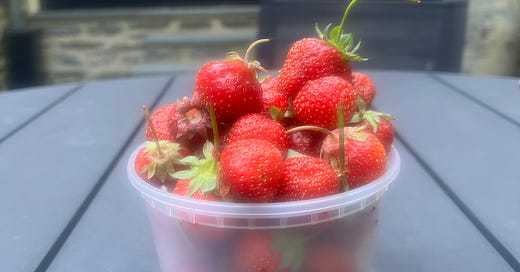When Abundance Meets Scarcity
... and perceiving abundance in a landscape of apparent scarcity.
Last week I shared a parable that I concocted - the Parable of the Strawberries. The spark for this story and its morals is found in two moments I experienced a couple of weeks ago, one after the other. I had been to a meeting at an elementary school in Germantown, quite near Grumblethorpe, at which the proportion of students living in conditions of want (poverty, homelessness) is remarkably high. I was discussing with the staff how Grumblethorpe could be a better resource to the students and their families. Some good ideas are flowing from that conversation. When I returned to Grumblethorpe I found the strawberry patch there was producing prodigiously, and I was struck that the ripe strawberries were going to go to waste because no one would be there to pick them for a couple more days. So I picked some of the strawberries, and took them to share with people whom I could tell about Grumblethorpe. I also brought some to the principal of the school.
It was clear to me almost immediately that I was being taught a lesson about scarcity and abundance. In contexts only steps away from each other I was experiencing narratives of both scarcity and abundance. And I have been shaped by the Gospel of Jesus which itself includes a narrative that asserts that when abundance meets scarcity it should do something about it. Perhaps if I was an artist I would make an allegorical painting of Abundance sharing her Fruits with Scarcity. It’s a shame I can’t paint.
When Abundance meets Scarcity it should do something about it. The implications of this lesson seem so obvious and straightforward; why are they so difficult for us to digest? In my imagination, a thread of this narrative runs through the American story: abundance has often met scarcity in this nation and done something about it. It feels as though some kind of imperative springs from the democratic spirit that (at its best) sees dignity and potential in every person. The abundance that is reaped in this nation is vast beyond measure; but recent trends have bent toward a profound reluctance to do something about it when that Abundance espies Scarcity at ever-widening remove. I strongly suspect that this disconnect is the greatest social threat of our time.
The idea of the economy of giftedness, which I espouse and promote, compels me to acknowledge that whatever gifts I have come from God. On reflection, I suspect that one of those gifts is the ability (maybe it’s nothing more than a desire or inclination?) to perceive abundance even in a landscape of apparent scarcity. Such an inclination and desire is born in the Gospel and nurtured wherever the truth of the Good News is shared. These days, even in the nominal fields of the Gospel, the harvest is plentiful, but the laborers are few. Is this familiar teaching an assurance of abundance or a warning of scarcity? It all depends on how you perceive it. In the economy of giftedness, however, warnings of scarcity sound fundamentally un-true; so through the lens of this true economy, the abundance of the harvest is the unavoidable narrative of truth.
What can I do but rejoice that as I move toward my 58th year, in a time when my entire life has been upended, and when the world is in distress all around me, and I find that I am presented with signs of abundance even in a landscape of scarcity? This was the effect of the strawberries on me: exuberance.
But the effect is deeper. Because I note a certain grammatical difficulty in the formula that I propose: when Abundance meets Scarcity it should do something about it. The pronouns leave room for confusion about their antecedents - it should do something about it. This construction is a little clunky, a little unclear. I suspect that a better construction of the formula would be this: when Abundance meets Scarcity we should do something about it. To whomever asks if they are included in the we, the answer will be, Yes!
There remains the challenge of perceiving abundance for what it is. In the parable, the abundance of strawberries is meant to be unavoidably self-apparent. But I know that outside of parables such clarity is not always the case. You can be standing in the midst of abundance and not even know it. I think we see a lot of that phenomenon these days, and I know that there are often understandable reasons for it. But if I’m correct about the economy of giftedness, then the truth will nearly always be found on the side of abundance; though you’ve got to take the trouble to gather it, and you can’t hoard it (see: Manna).
I am taking on some additional work these days that I’m happy to say involves sharing an abundance. I’ll tell you more about it some time soon. For the time being, as I organize my time and energy around a number of different projects in a number of different institutions, I am hoping that I can adopt this organizing principle to most of what I’m doing: when Abundance meets Scarcity, we should do something about it.





I’m so grateful for these reminders, friend. We are all Abundant.
May recognizing the abundance within yourself always bring you such exuberance! It made me happy to hear of it.